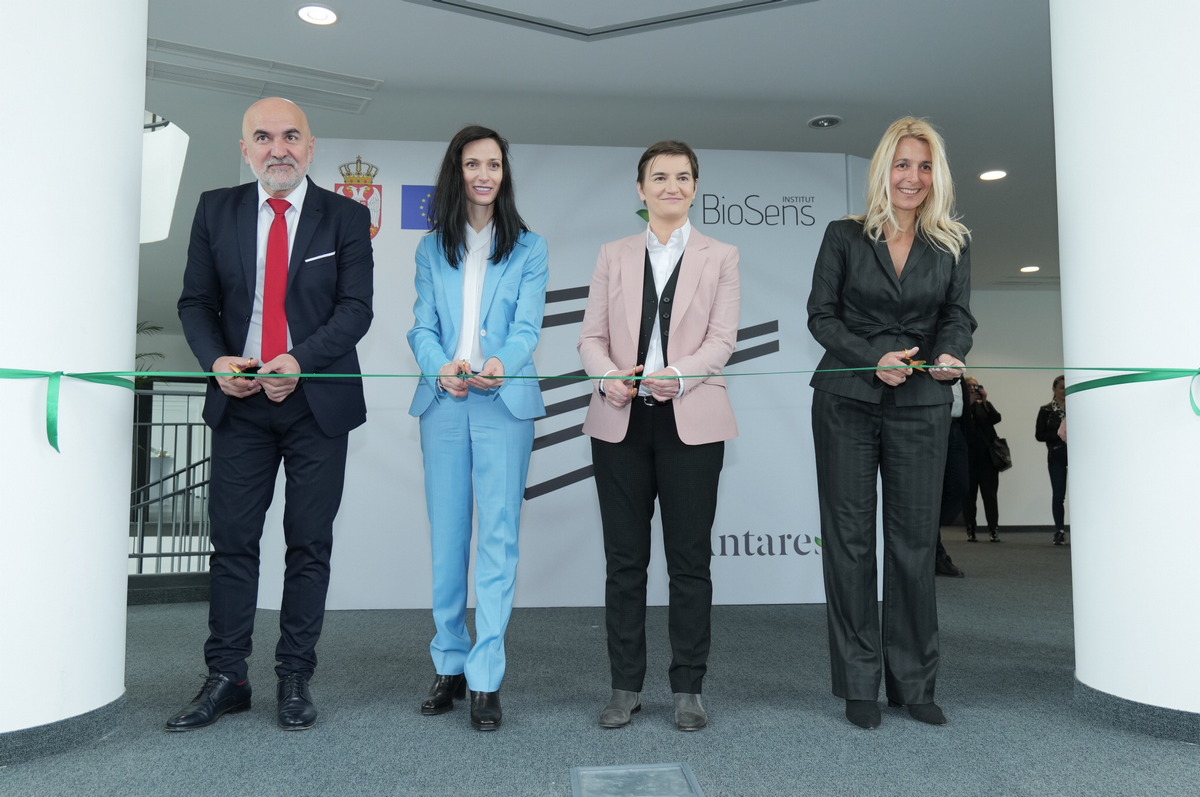- A new building for the BioSense Institute in Serbia will provide facilities for advanced research in the fields of biotechnology and agriculture, increasing the digitalisation, competitiveness and productivity of the Serbian economy.
- The project received a €14 million EU grant, as well as funds from EIB Global and the Serbian government.
- Since 2005, the EIB has provided €415 million for research and development projects and education in the Western Balkans.

A new BioSense Institute building was officially opened today in Novi Sad. Benefiting from a prime location at the entrance of the city centre, it will offer almost 7 000 m2 of state-of-the-art facilities for scientific research and business ventures. As part of the University of Novi Sad, the premises provide high-end laboratories and workplaces for life sciences studies for around 250 scientists. Startups will have a dedicated area for the development of innovative solutions in the fields of agriculture and biotechnology. These new facilities, with their highly sophisticated equipment, will reinforce the institute’s scientific potential and transformation into a European centre of excellence that is capable of conducting the most advanced research projects applicable on a global scale.
This project worth €34 million was financed by €14 million in EU grants via the ANTARES project, €20 million from the Serbian government and a European Investment Bank (EIB) loan of €18 million. The opening ceremony was attended by the European Commissioner for Innovation, Research, Culture, Education and Youth Mariya Gabriel, Serbian Prime Minister Ana Brnabić, Serbian ministers Tanja Miščević (European integration), Jelena Begović (science, technological development and innovation), Jelena Tanasković (agriculture, forestry and water management), Mihailo Jovanović (IT), Marko Blagojević (public investment) and Branko Ružić (education), as well as President of the Government of Vojvodina Igor Mirović, representatives of the EU Delegation in Serbia and EIB Global.
At the opening ceremony, European Commissioner Mariya Gabriel said: ““BioSense’s path to becoming a Centre of Excellence for Advanced Technologies in Sustainable Agriculture and Food Security was a journey together with the EU. This partnership is a success story. The EU has been key in supporting BioSense to build its capacities and to boost state of the art science in Serbia. The institute is the manifestation of this collaboration between the EU and Serbia. We have been working with excellent partners to build something long lasting that connects Serbia further with the EU.”
With specific anti-vibration features, this is the first building of its kind ever to be built in Serbia. It will enable highly sensitive equipment to be used for the development of sensors, microtechnologies and nanotechnologies.
Felicitas Riedl, director of the EIB Innovation and Competitiveness Department, said: “As the EU bank and a long-standing partner of Serbia, EIB Global is especially delighted to support the creation of such a dynamic, modern and inspiring environment for the entire innovation community in the country and the wider region. Thanks to these advanced facilities, including a state-of-the-art clean room, the institute will be in a position to attract top-notch talent not only from Serbia, but from around the world. They will have a unique opportunity to design sustainable and digitalised solutions for agriculture and life sciences, which will be essential for addressing the climate, resource and food scarcity challenges. This is also in line with EIB Global’s investment priorities.”
Prime Minister of the Republic of Serbia Ana Brnabić said: “Digital agriculture is a synergy between technology and agriculture. This synergy is necessary in the context of climate challenges to ensure that the agriculture is sustainable, that it brings better results and that we, as a country, can provide an adequate support to our farmers in order to be competitive in the future, with the help of science and scientific institutes.”
Director of the BioSense Institute Vladimir Crnojević said: “This is one of the most technologically complex buildings in Serbia, the first building in Europe with such kind of integrated anti-vibration solution. Today, we are opening a new chapter thanks to laboratories for cutting-edge research in the field of nano and microelectronics. We have a large data centre that will support artificial intelligence, satellite imagery, bioinformatics and all other future demands.”
ANTARES project manager Vesna Bengin said: “Today, Serbia is recognized as a scientific destination, top researchers from all over the world apply for the competitions we announce.” Today, students in Serbia choose majors in order to get a job at the BioSens Institute and to build their scientific careers in their country. These are huge results”, said Vesna Bengin”.
The ANTARES project has enabled the BioSense Institute to grow from only 50 employees at the beginning of the project to over 140 employees, with more than 50 holding a PhD degree. ANTARES has directly financed 37 new positions, with 15 more expected to be created before the end of the project. It has significantly boosted the institute’s scientific capacity, resulting in 36 new Horizon projects, 22 other international projects, nine industrial projects and 38 national projects, with a total income of around €20.5 million. To date, the European Unio has supported Serbian research and development activities through €90 million in competitive research grants.
The EIB invests in education, research and innovation across the globe to increase the capacity and improve the quality of education systems, with a total of €51 billion in lending for this sector. In the Western Balkans, it has provided €415 million since 2005 for research and development projects and education, helping to build, renovate and digitalise education and science facilities. The funds also supported the construction of science and technology parks in Niš, Belgrade and Novi Sad, as well as the BioSense building.